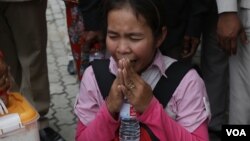People evicted from their homes to make way for construction and development projects often end up in poor conditions after relocation, including in new homes that are regularly flooded, a new report has alleged.
The report, titled “Promises Kept?”, published by local NGO Sahmakum Teang Tnaut (STT) on Tuesday, studied 77 sites where people had been evicted since 2011.
Many have suffered problems with disease and financial burdens as a result of the evictions, the report notes. In the Chei Chummeah community, for example, it says infectious diseases spread rapidly in the resettlement village due to flooding with unsafe water.
The lack of a specific plan for urban development in Phnom Penh has led to conditions of housing insecurity for many, the report adds.
Soeung Saran, advocacy program manager at STT, said: “At this point, we have to question whether development provides more benefit than the eviction [provides harm]. When the development grows, evictions also increase.”
In many of the eviction sites studied by STT, areas where homes were demolished were often replaced with luxury apartments and sports facilities.
“For example, in the 78 Community ... City Hall said before the people were evicted that they would use that location to build a public park. But ... that location was used to build football pitches and develop big apartments. That’s completely different from what they promised the people,” Saran added.
Those at risk of eviction were also subjected to regular threats and intimidation, he said.
Meas Sreymom, 48, who is facing eviction from Tuol Kok district’s Boeung Kak II commune, said they had not been consulted ahead of being notified they would be evicted.
Sar Sorn, a Borei Keila community representative, said, like many others facing eviction in Phnom Penh, they had no plans to relocate. “I still have the will to protest for my home, because it’s the life and future of my children.”
Meth Meas Pheakdey, a City Hall spokesman, denied the allegations in the report, claiming that local communities were always consulted before a project moved ahead.
He claimed the authorities kept a close eye on communities that had been relocated. “We [look at] how we can help the community. Does their community have proper water, electricity, a school, or infrastructure? How can we organize for them? What are they lacking? We continue to do this work,” he said.
In 2014, STT estimate that almost 30,000 people had faced forced eviction in Phnom Penh since 1990.







